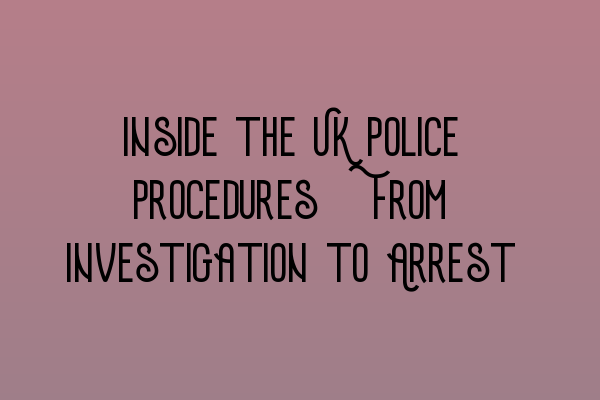Inside the UK Police Procedures: From Investigation to Arrest
When it comes to criminal law, understanding the police procedures involved in an investigation and subsequent arrest is crucial. In this article, we will take an in-depth look at the UK police procedures, providing you with valuable insights into how the process works.
1. Investigation
The investigation phase is where the police gather evidence and facts related to a criminal offense. This process involves conducting interviews, collecting forensic evidence, and reviewing any available CCTV footage. It is crucial for the police to ensure that they follow all proper protocols during this phase to maintain the integrity of the evidence.
If you’re interested in practicing criminal law, it is essential to have a solid understanding of investigation techniques and the relevant legislation surrounding it. To prepare for the SQE 1 exam, you can access SQE 1 Practice Exam Questions and SQE 1 Practice Mocks FLK1 FLK2 to enhance your knowledge and test your understanding.
2. Arrest
Once the investigation phase is complete and the police have gathered sufficient evidence, they may proceed with making an arrest. Arrests are made when there are reasonable grounds to suspect an individual of committing a criminal offense. The police are required to follow strict guidelines and procedures when making an arrest to ensure the rights of the individual are protected.
To excel in criminal law and practice, it is crucial to understand the intricacies of arrest protocols and the laws that govern them. To enhance your knowledge and skillset, you can enroll in SQE 2 Preparation Courses. These courses will provide you with comprehensive guidance on arrest procedures and other essential aspects of criminal law practice.
3. Detention and Questioning
After an arrest, the individual may be taken into custody and held for questioning. The police have the authority to detain a suspect for a reasonable period to gather further evidence, obtain statements, and clarify any uncertainties. During this process, the detained individual has the right to legal representation and must be made aware of this right.
To prepare for the SQE exams and familiarize yourself with the legal aspects of detention and questioning, you can access SQE 1 Preparation Courses. These courses will equip you with the knowledge needed to navigate this crucial phase of a criminal investigation.
4. Charge or Release
Following the detention and questioning phase, the police will decide whether to charge the suspect with a criminal offense or release them. If charged, the suspect will proceed through the criminal justice system, and the case will be presented in court. If released, further investigation may be required or, in some cases, no further action may be taken.
Conclusion
Understanding the UK police procedures involved in criminal investigations and arrests is vital for anyone pursuing a career in criminal law. By familiarizing yourself with all the key aspects, from investigation to arrest, you can better serve your clients and effectively navigate the legal system.
To stay up-to-date with the latest information on SQE exams and their corresponding dates, you can visit SRA SQE Exam Dates. Stay informed and be well-prepared for your future in criminal law.
